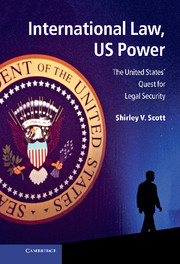Book contents
- Frontmatter
- Contents
- Acknowledgements
- Introduction: beyond the myth of the golden age
- 1 The US quest for legal security
- 2 The US pursuit of legal security through the evolution of the international law of dispute resolution
- 3 The US pursuit of legal security through the evolving regime relating to the use of force
- 4 The US pursuit of legal security in substantive policy arenas
- 5 Techniques through which the United States has reconciled its practice of offensive legal security with the principle of sovereign equality
- 6 The practice of offensive legal security in US diplomacy
- 7 The future of US engagement with international law
- Appendix
- Select bibliography
- Index
- References
7 - The future of US engagement with international law
Published online by Cambridge University Press: 05 June 2012
- Frontmatter
- Contents
- Acknowledgements
- Introduction: beyond the myth of the golden age
- 1 The US quest for legal security
- 2 The US pursuit of legal security through the evolution of the international law of dispute resolution
- 3 The US pursuit of legal security through the evolving regime relating to the use of force
- 4 The US pursuit of legal security in substantive policy arenas
- 5 Techniques through which the United States has reconciled its practice of offensive legal security with the principle of sovereign equality
- 6 The practice of offensive legal security in US diplomacy
- 7 The future of US engagement with international law
- Appendix
- Select bibliography
- Index
- References
Summary
As the patriots of seventy-six did to the support of the Declaration of Independence, so to the support of the Constitution and Laws, let every American pledge his life, his property, and his sacred honor; – let every man remember that to violate the law, is to trample on the blood of his father, and to tear the character of his own, and his children’s liberty . . . let [a reverence for the laws] become the political religion of the nation; and let the old and the young, the rich and the poor, the grave and the gay, of all sexes and tongues, and colors and conditions, sacrifice unceasingly upon its altars.
While ever a state of feeling, such as this shall universally, or even, very generally prevail throughout the nation, vain will be every effort, and fruitless every attempt, to subvert our national freedom.
Abraham Lincoln, 1838The United States has an expansionist history. Within the same continent at first, and then abroad, the United States continued to extend its reach until it was the predominant power globally and in space. War was key to the rise of the United States, whether that be through avoiding a European war, or fighting and winning. Even the Civil War (1861–5) ‘assured that the United States would become a “great power” capable of leading the “free world”’. And yet the United States was able to develop a global projection of power largely without being recognized as imperial or expansionist. The rise of the United States was accompanied by what Andrew Bacevich has referred to as the myth of the reluctant superpower. ‘Some nations may be said to be born to power; others achieve power, or try to. Of the United States alone can it truly be said that power has been thrust upon her?’ According to the myth, the United States has only ever reluctantly been drawn into war by external factors, and only ‘inadvertently’ acquired an empire.
- Type
- Chapter
- Information
- International Law, US PowerThe United States' Quest for Legal Security, pp. 233 - 247Publisher: Cambridge University PressPrint publication year: 2012
References
- 1
- Cited by



